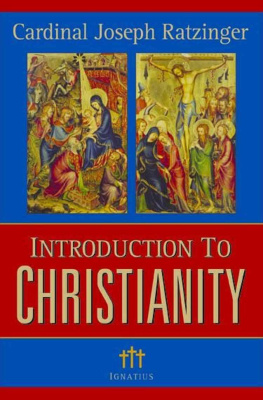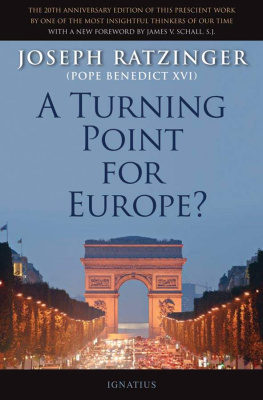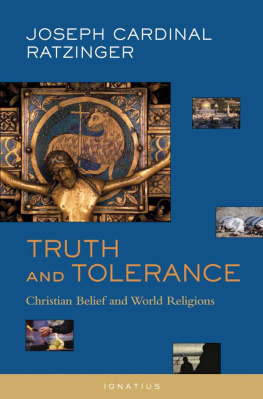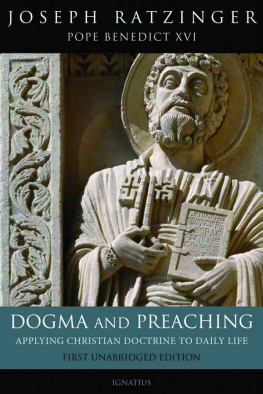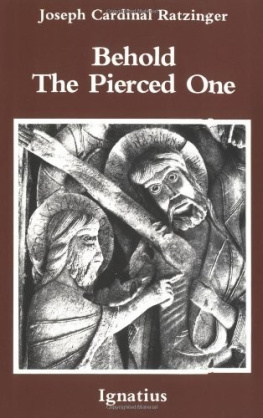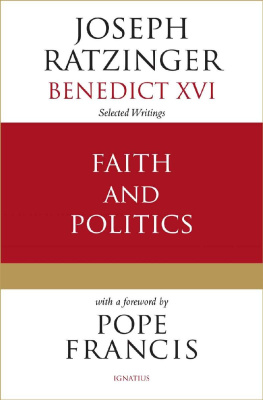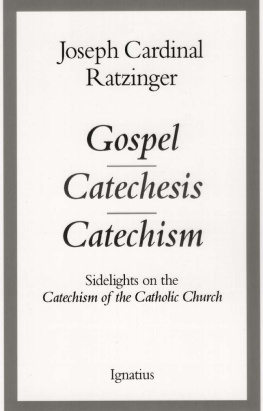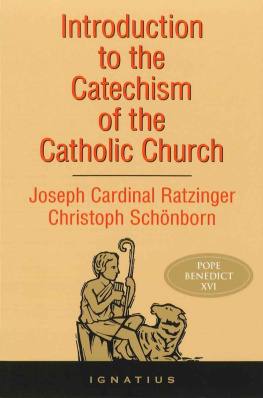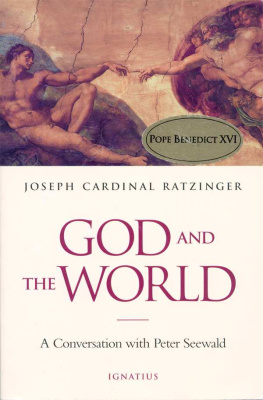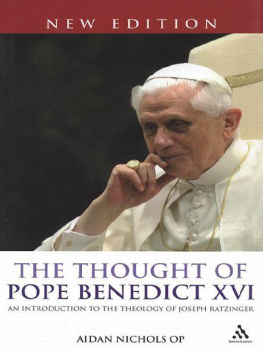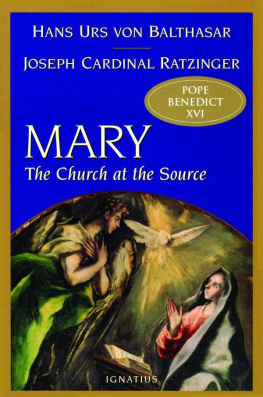INTRODUCTION TO CHRISTIANITY
JOSEPH CARDINAL RATZINGER
INTRODUCTION
TO
CHRISTIANITY
Translated by J. R. Foster
With a New Preface
Translated by Michael J. Miller
COMMUNIO BOOKS
IGNATIUS PRESS SAN FRANCISCO
Title of the German original:
Einfhrung in das Christentum
1968 by Ksel-Verlag GmbH, Munich
English translation 1969 by Burns and Oates, Ltd.
New with ecclesiastical approval
German edition, published with a new preface, 2000
Diptych: Adoration of the Magi and The Crucifixion .
Museo Nazionale del Bargello, Florence, Italy
Scala / Art Resource, N.Y.
Cover design by Riz Boncan Marsella
Revisions to the English edition and Preface
1990 2004 Ignatius Press, San Francisco
All rights reserved ISBN 1-58617-029-5
Library of Congress Control Number 2004103523
Printed in the United States of America
TO MY UNIVERSITY STUDENTS
IN FREISING, BONN, MNSTER
AND TBINGEN
CONTENTS
INTRODUCTION: I BELIEVEAMEN
I.
1. Doubt and beliefMans situation before the question of God
2. The origin of beliefProvisional attempt at a definition of belief
3. The dilemma of belief in the world of today
4. The boundary of the modern understanding of reality and the place of belief
5. Faith as standing firm and understanding
6. The rationality of faith
7. I believe in you
II.
1. Introductory remarks on the history and structure of the Apostles Creed
2. Limits and meaning of the text
3. Creed and dogma
4. The Creed as expression of the structure of faith
PART ONE: GOD
I.
1. The scope of the question
2. The profession of faith in the one God
II.
1. The problem of the story of the burning bush
2. The intrinsic assumption of the belief in Yahweh: The God of [Israels] fathers
3. Yahweh, the God of our Fathers and the God of Jesus Christ
4. The idea of the name
5. The two sides of the biblical concept of God
III.
1. The decision of the early Church in favor of philosophy
2. The transformation of the God of the philosophers
3. The reflection of the question in the text of the Creed
IV.
1. The primacy of the logos
2. The personal God
V.
1. A start at understanding
2. Positive significance
PART TWO: JESUS CHRIST
I.
1. The dilemma of modern theology: Jesus or Christ?
2. The Creeds image of Christ
3. The point of departure of faith in Jesus: The Cross
4. Jesus the Christ
1. The formulation of the question
2. A modern stock idea of the historical Jesus
3. The claim of christological dogma
1. Theology of the Incarnation and theology of the Cross
2. Christology and the doctrine of redemption
3. Christ, the last man
II.
1. Conceived by the power of the Holy Spirit and born of the Virgin Mary
2. Suffered under Pontius Pilate, was crucified, died, and was buried
3. Descended into hell
4. Rose again [from the dead]
5. He ascended into heaven and is seated at the right hand of the Father
6. He will come again to judge the living and the dead
PART THREE: THE SPIRIT AND THE CHURCH
I.
II.
1. The holy, catholic Church
2. The resurrection of the body
PREFACE TO THE NEW EDITION
Introduction to Christianity
Yesterday, Today, Tomorrow
Since this work was first published, more than thirty years have passed, in which world history has moved along at a brisk pace. In retrospect, two years seem to be particularly important milestones in the final decades of the millennium that has just come to an end: 1968 and 1989. The year 1968 marked the rebellion of a new generation, which not only considered postwar reconstruction in Europe as inadequate, full of injustice, full of selfishness and greed, but also viewed the entire course of history since the triumph of Christianity as a mistake and a failure. These young people wanted to improve things at last, to bring about freedom, equality, and justice, and they were convinced that they had found the way to this better world in the mainstream of Marxist thought. The year 1989 brought the surprising collapse of the socialist regimes in Europe, which left behind a sorry legacy of ruined land and ruined souls. Anyone who expected that the hour had come again for the Christian message was disappointed. Although the number of believing Christians throughout the world is not small, Christianity failed at that historical moment to make itself heard as an epoch-making alternative. Basically, the Marxist doctrine of salvation (in several differently orchestrated variations, of course) had taken a stand as the sole ethically motivated guide to the future that was at the same time consistent with a scientific world view. Therefore, even after the shock of 1989, it did not simply abdicate. We need only to recall how little was said about the horrors of the Communist gulag, how isolated Solzhenitsyns voice remained: No one speaks about any of that. A sort of shame forbids it; even Pol Pots murderous regime is mentioned only occasionally in passing. But there was still disappointment and a deep-seated perplexity. People no longer trust grand moral promises, and after all, that is what Marxism had understood itself to be. It was about justice for all, about peace, about doing away with unfair master-servant relationships, and so on. They believed that they had to dispense with ethical principles for the time being and that they were allowed to use terror as a beneficial means to these noble ends. Once the resulting human devastation became visible, even for a moment, the former ideologues preferred to retreat to a pragmatic position or else declared quite openly their contempt for ethics. We can observe a tragic example of this in Colombia, where a campaign was started, under the Marxist banner at first, to liberate small farmers who had been downtrodden by wealthy financiers. Today, instead, a rebel republic has developed, beyond governmental control, which quite openly depends on drug trafficking and no longer seeks any moral justification for it, especially since it thereby satisfies a demand in wealthy nations and at the same time gives bread to people who would otherwise not be able to expect much of anything from the world economy. In such a perplexing situation, should not Christianity try very seriously to rediscover its voice, so as to introduce the new millennium to its message and to make it comprehensible as a general guide for the future?
Anyway, where was the voice of the Christian faith at that time? In 1967, when the book was being written, the fermentation of the early postconciliar period was in full swing. This is precisely what the Second Vatican Council had intended: to endow Christianity once more with the power to shape history. The nineteenth century had seen the formulation of the opinion that religion belonged to the subjective, private realm and should have its place there. But precisely because it was to be categorized as something subjective, it could not be a determining factor in the overall course of history and in the epochal decisions that had to be made as part of it. Now, following the Council, it was supposed to become evident again that the faith of Christians embraces all of life, that it stands in the midst of history and in time and has relevance beyond the realm of subjective notions. Christianityat least from the viewpoint of the Catholic Churchwas trying to emerge again from the ghetto to which it had been relegated since the nineteenth century and to become involved once more in the world at large. We do not need to discuss here the intra-ecclesiastical disputes and frictions that arose over the interpretation and assimilation of the Council. The main thing affecting the status of Christianity in that period was the idea of a new relationship between the Church and the world. Although Romano Guardini in the 1930s had coined the expression Unterscheidung des Christlichen [distinguishing what is Christian]something that was extremely necessary thensuch distinctions now no longer seemed to be important; on the contrary, the spirit of the age called for crossing boundaries, reaching out to the world and becoming involved in it. It was demonstrated already upon the Parisian barricades in 1968 how quickly these ideas could emerge from the academic discussions of churchmen and find a very practical application: a revolutionary Eucharist was celebrated there, thus putting into practice a new fusion of the Church and the world under the banner of the revolution that was supposed to bring, at last, the dawn of a better age. The leading role played by Catholic and Protestant student groups in the revolutionary upheavals at universities, both in Europe and beyond, confirmed this trend.
Next page
